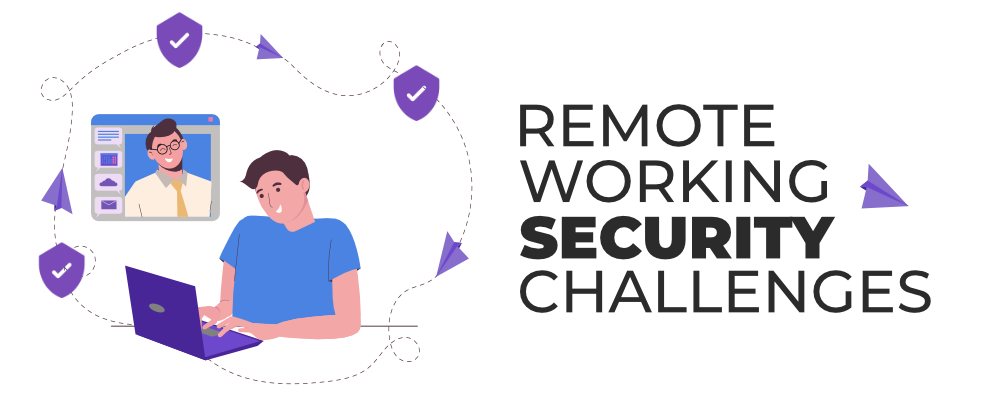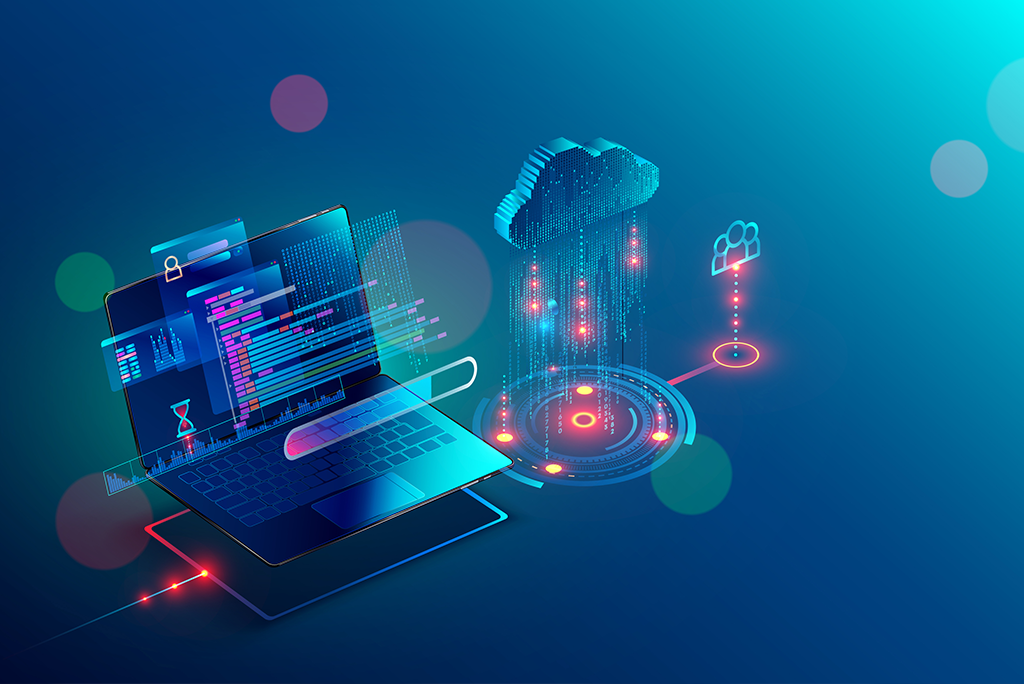Challenges of Remote Work Security: The shift to remote work has transformed the way businesses operate across the United States. While this model offers flexibility and increased productivity, it also brings significant security challenges. With employees accessing sensitive company data from various locations, ensuring robust cybersecurity measures is more critical than ever. This blog will explore the key security challenges associated with remote work and provide actionable tips for USA businesses to protect their data, maintain compliance, and secure their remote workforce. For further information, check out the section on “Challenges of Remote Work Security” in this blog.

Understanding the Security Risks of Remote Work
Remote work expands the attack surface for cyber threats, making businesses more vulnerable to data breaches, phishing attacks, and other cybersecurity risks. The primary challenges include: More insights can be found under “Challenges of Remote Work Security” in this blog.

- Increased Vulnerability to Cyber Attacks: With employees working from home or other remote locations, company networks are often accessed through personal devices and unsecured Wi-Fi networks. This increases the risk of unauthorized access and cyberattacks, such as ransomware and malware.
- Lack of Physical Security: Unlike in a traditional office environment, remote workers may not have the same level of physical security for their devices. Laptops, smartphones, and other devices could be lost, stolen, or accessed by unauthorized individuals, leading to potential data breaches.
- Weak Password Practices: Employees working remotely may use weak passwords or reuse passwords across multiple accounts, increasing the likelihood of credential theft. Without strong password policies and multi-factor authentication (MFA), businesses are at greater risk of unauthorized access.
- Insufficient Security Training: Many employees may not be adequately trained in cybersecurity best practices, particularly in recognizing phishing attempts or securing their home networks. This lack of awareness can lead to inadvertent security breaches.
- Data Privacy Concerns: Remote work can blur the lines between personal and professional activities, leading to concerns about data privacy. Employees may inadvertently expose sensitive company data to family members or use personal devices for work-related tasks without proper security controls.
- Compliance Challenges: Maintaining compliance with industry regulations, such as GDPR, HIPAA, or CCPA, can be more challenging in a remote work environment. Ensuring that remote work practices align with regulatory requirements is essential to avoid fines and legal repercussions.
Tips for Securing Your Remote Workforce
To navigate the challenges of remote work security, USA businesses should implement a comprehensive security strategy that addresses both technical and human factors. Here are some essential tips:

- Implement Strong Access Controls: Access control is the first line of defense against unauthorized access. Businesses should enforce strong password policies, requiring employees to use complex passwords and change them regularly. Implementing multi-factor authentication (MFA) adds an additional layer of security, ensuring that even if a password is compromised, unauthorized access is prevented.
- Secure Remote Access with VPNs: Virtual Private Networks (VPNs) are essential for securing remote access to company networks. VPNs encrypt data transmitted between remote workers and the company network, making it more difficult for cybercriminals to intercept sensitive information. Ensure that all employees use a VPN when accessing company resources remotely.
- Provide Security Training and Awareness Programs: Educating employees about cybersecurity best practices is crucial in preventing security breaches. Regularly conduct security training sessions that cover topics such as recognizing phishing emails, securing home networks, and safe internet browsing. Encourage employees to report suspicious activities immediately. The blog elaborates on “Challenges of Remote Work Security” for more details.
- Use Endpoint Security Solutions: Endpoint security solutions, such as antivirus software, firewalls, and intrusion detection systems, should be installed on all devices used for remote work. These tools can detect and block potential threats before they cause damage. Ensure that all software is regularly updated to protect against the latest vulnerabilities.
- Enforce Data Encryption: Data encryption is vital for protecting sensitive information both at rest and in transit. Encourage employees to use encryption tools for files and emails, and ensure that all company data stored on remote devices is encrypted. This minimizes the risk of data being accessed by unauthorized parties in the event of device loss or theft.
- Establish Clear Remote Work Policies: A comprehensive remote work policy should outline the security protocols and expectations for remote employees. This includes guidelines on device usage, data access, password management, and reporting security incidents. Make sure that all employees understand and adhere to these policies.
- Regularly Monitor and Audit Remote Work Activities: Continuous monitoring and auditing of remote work activities help identify potential security risks before they escalate. Use security information and event management (SIEM) tools to track and analyze remote access logs, flagging any unusual or unauthorized activities. Regular audits also help ensure compliance with regulatory requirements. Details are available in the “Challenges of Remote Work Security” part of this blog.
- Implement Zero Trust Security Model: The Zero Trust security model assumes that no device or user, whether inside or outside the network, should be trusted by default. Under this model, every request for access is authenticated, authorized, and encrypted. Implementing Zero Trust principles can help mitigate risks associated with remote work by minimizing the attack surface and ensuring that only legitimate users have access to company resources.
- Encourage the Use of Company-Issued Devices: Where possible, provide employees with company-issued devices that are pre-configured with the necessary security tools and settings. This ensures that all devices used for work are properly secured and reduces the risk of employees using personal devices that may not meet the same security standards.
- Regularly Back Up Data: Regular data backups are essential for disaster recovery in the event of a cyberattack or system failure. Implement automated backup processes that regularly save copies of critical data to secure, off-site locations. This ensures that business operations can continue with minimal disruption even if data is lost or compromised.

Read More:
The Role of Integral Systems in Remote Work Security
Navigating the complexities of remote work security requires expertise and the right tools. Integral Systems is a trusted partner for USA businesses, offering comprehensive cybersecurity solutions that protect your remote workforce and ensure business continuity. To learn more, see the section titled “Challenges of Remote Work Security” in this blog.
Why Choose Integral Systems?
- Expertise in Remote Work Security: Integral Systems has extensive experience in implementing and managing cybersecurity strategies tailored to remote work environments. Our solutions are designed to address the unique challenges faced by businesses with distributed teams.
- Comprehensive Cybersecurity Services: From VPN implementation and endpoint security to employee training and compliance management, Integral Systems provides end-to-end services that safeguard your remote operations.
- Customized Solutions: We understand that every business has unique security needs. Our team works closely with you to develop customized solutions that align with your specific requirements and industry regulations. For comprehensive details, refer to “Challenges of Remote Work Security” in this blog.
- Proactive Threat Monitoring: Our advanced threat monitoring services ensure that potential security risks are identified and addressed before they can impact your business. We provide real-time alerts and actionable insights to keep your remote workforce secure.
- Ongoing Support: As your business evolves, so do your security needs. Integral Systems offers ongoing support and maintenance to ensure that your cybersecurity measures remain effective and up-to-date.

Contact Integral Systems
For more information on how Integral Systems can help your business navigate the challenges of remote work security, contact us today.
Social Media:
Website: https://tinyurl.com/5xjtp7hm
Address: 1201 West Esplanade Ave Apt. 303, LA, Kenner, United States 70065
Call: +1 888-335-9441
